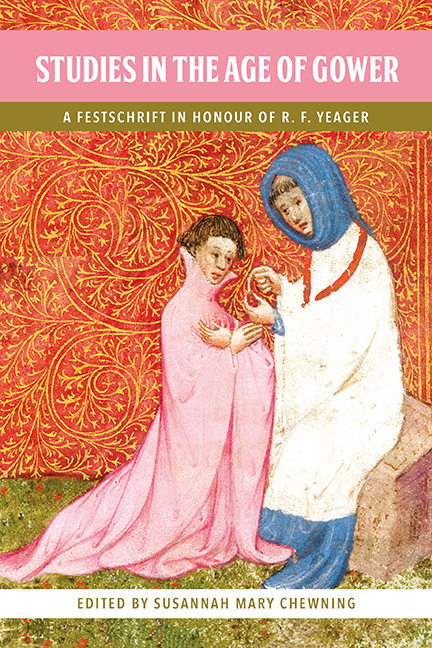Book contents
- Frontmatter
- Contents
- List of Illustrations
- Notes on Contributors
- Acknowledgements
- List of Abbreviations
- Introduction
- Part I Text
- Part II Gender
- Part III Time
- Part IV Spirit
- Part V Intersections
- A Personal Tribute to R.F. Yeager
- Bibliography of R.F. Yeager’s Writings
- General Bibliography
- Index
- Miscellaneous Endmatter
13 - The Constraints of Justice and Gower’s “Lawyerly Habit of Mind”
Published online by Cambridge University Press: 28 April 2020
- Frontmatter
- Contents
- List of Illustrations
- Notes on Contributors
- Acknowledgements
- List of Abbreviations
- Introduction
- Part I Text
- Part II Gender
- Part III Time
- Part IV Spirit
- Part V Intersections
- A Personal Tribute to R.F. Yeager
- Bibliography of R.F. Yeager’s Writings
- General Bibliography
- Index
- Miscellaneous Endmatter
Summary
AS R.F. YEAGER POINTS out, “it has been a commonplace of Gower studies, from the earliest days, to credit John Gower with training in the law of some kind; and many in writing about him (beginning with Leland, who had Chaucer and Gower meeting as students at the Inns of Court) have fledged Gower out a practicing lawyer in full feather.” However, documentary evidence for such biographical assignation is, as Yeager details, almost nonexistent. While we have evidence of significant real estate and property cases in which he was involved, Gower is nowhere identified in those transactions as a bona fide lawyer or legal professional of any kind. Gower's properties included holdings in London, Essex, East Anglia, and Kent, and one property, the manor of Aldington Septvauns, embroiled Gower in a legal dispute that John H. Fisher famously referred to as a “sticky wicket,” but even in that case Gower is only identified as one of the parties involved in the dispute, nor is it made clear he was representing himself. In May 1378, as he prepared to leave for Italy, Geoffrey Chaucer assigns Gower (and the lawyer Richard Forester) his power of attorney, but such an arrangement would not have required Gower to be a lawyer. Apart from such external evidence, the narrator of Mirour de l’Omme is described wearing the rayed sleeves often associated with legal professionals of Gower's day (21774), and much of Gower's poetry is replete with legal references, aspects, and inferences. Such a lack of direct evidence for Gower's membership in the legal profession, coupled with the significant legal influence and references in his poetry, led Yeager to identify and define Gower's “lawyerly habit of mind … how thoroughly the legal profession guided, even governed, Gower's way of looking at the world.” Thus, the assumption that even were he not a lawyer or part of an ancillary legal profession, Gower's works are governed, at least in part, by his understanding of, and possible participation in, the legal profession of his day, has opened avenues into his work that might otherwise have remained closed to us.
Much of the scholarship addressing Gower's legal influences in his poetry consider his construction of justice, litigation issues, or lawyerly representation.
- Type
- Chapter
- Information
- Studies in the Age of GowerA Festschrift in Honour of Robert F. Yeager, pp. 203 - 216Publisher: Boydell & BrewerPrint publication year: 2020

